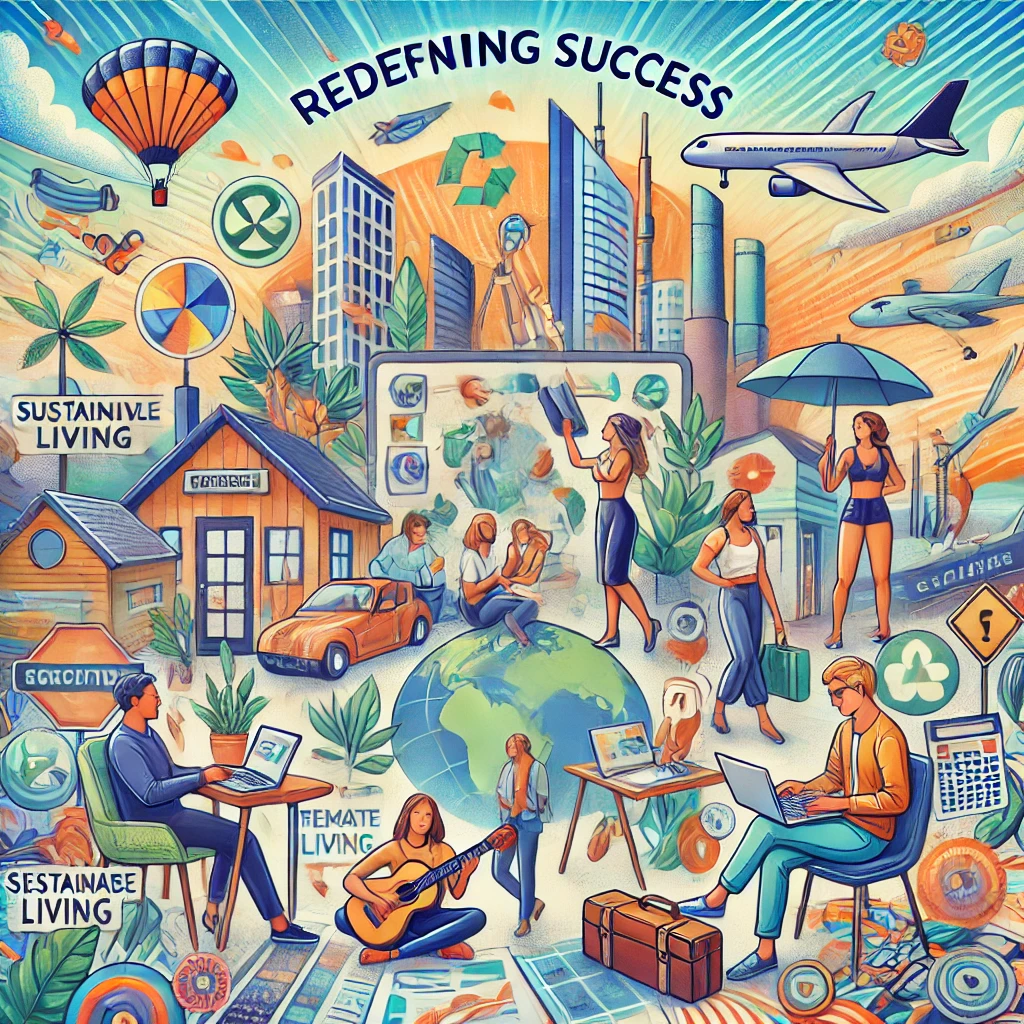Redefining Success: How Millennials and Gen Z Are Challenging Traditional Life Goals
Success has typically been associated with milestones like securing a stable job, buying a house, and raising a family. However, Millennials and Gen Z are transforming what it means to live a fulfilling life. Influenced by shifting societal values, economic circumstances, and technological progress, these generations are questioning traditional life goals and putting more emphasis on personal growth, meaningful experiences, and social contributions.
The Shift in Defining Success
Traditional Goals
For a long time, success was equated with financial stability and measurable achievements:
- Education: Earning a college degree.
- Career: Securing a well-paying, long-term job.
- Assets: Owning a home and car.
- Family: Getting married and having children.
While these aspirations are still important to many, Millennials and Gen Z are broadening the concept of success to include less tangible but equally vital goals.
The New Priorities
- Personal Fulfillment: Emphasizing mental health, happiness, and self-discovery over societal norms.
- Work-Life Balance: Seeking jobs that offer flexibility and prevent burnout.
- Social Impact: Supporting causes that align with their values, such as environmental sustainability and social justice.
- Experiential Living: Placing higher value on experiences like travel and hobbies over material possessions.
Factors Driving the Redefinition
- Economic Realities
- Student Debt: Increasing tuition fees have burdened many Millennials with considerable student loans.
- Housing Market Challenges: Soaring property prices make homeownership unattainable for many.
- Gig Economy: The rise of short-term contracts and freelance work has altered job stability.
- Technological Influence
- Digital Nomadism: Remote work allows individuals to prioritize location-independent lifestyles.
- Social Media: Platforms highlight diverse paths to success, challenging traditional models.
- Access to Knowledge: Online courses and resources enable self-taught skills and unconventional career paths.
- Cultural and Social Shifts
- Mental Health Awareness: Increased focus on emotional well-being has led many to reconsider high-stress careers.
- Changing Family Dynamics: Fewer people see marriage and parenthood as essential for a successful life.
- Environmental Concerns: Younger generations prioritize sustainability and ethical consumption.
How Millennials and Gen Z Define Success
- Careers: Passion Over PaychecksMillennials and Gen Z often pursue careers that align with their passions and values, even if it means earning less.
- Examples:
- Choosing creative careers like photography or writing despite financial uncertainty.
- Prioritizing jobs with ethical companies committed to diversity or sustainability.
- Exploring entrepreneurship to achieve autonomy and realize unique visions.
- Examples:
- Education: Learning Without LimitsWhile education is still important, the approach to acquiring knowledge has diversified:
- Online certifications and platforms such as Coursera and Udemy offer affordable and flexible learning.
- Many opt for vocational training or specialized skills over traditional degrees.
- Housing: Flexibility Over OwnershipWith property costs rising, many Millennials and Gen Zers prefer renting or alternative living arrangements over owning a home.
- Examples:
- Embracing van life, tiny homes, and co-living spaces for their affordability and mobility.
- Examples:
- Relationships: Redefining FamilyMore people are choosing to stay single or delay marriage and having children.
- Emphasis is placed on building chosen families through friendships and communities.
- Experiences: Memories Over Material GoodsTravel, hobbies, and personal development are seen as essential to a fulfilling life. Experiences are considered investments in happiness and growth, not luxuries. ## The Significance of Social Impact in Achieving Success
Millennials and Gen Z place high importance on social responsibility when defining success:
Environmental Care: Promoting eco-friendly practices and climate action. Advocacy Efforts: Championing LGBTQ+ rights, racial justice, and gender equality. Ethical Consumption: Preferring brands committed to ethical standards.
Challenges in Redefining Success
Societal Perception: Traditional views might disapprove of unconventional paths or life goals. Economic Uncertainty: Focusing on passion projects or traveling can bring financial instability. Mental Health Strain: Social media comparisons can lead to unrealistic expectations and stress.
Lessons from Millennials and Gen Z
Adaptability: Success varies for each individual; there’s no universal formula. Well-being: Mental health and self-care are fundamental for a balanced life. Meaning Over Status: Fulfilling work and social impact are more important than traditional success metrics.
Conclusion
Millennials and Gen Z are reshaping success by moving away from conventional goals and following paths that emphasize wellness, personal development, and social contributions. Although their approach might face criticism or obstacles, it signifies a shift in values toward individuality and global awareness. These generations show that success isn’t just about reaching specific milestones—it’s about living a genuine and meaningful life.




Post Comment